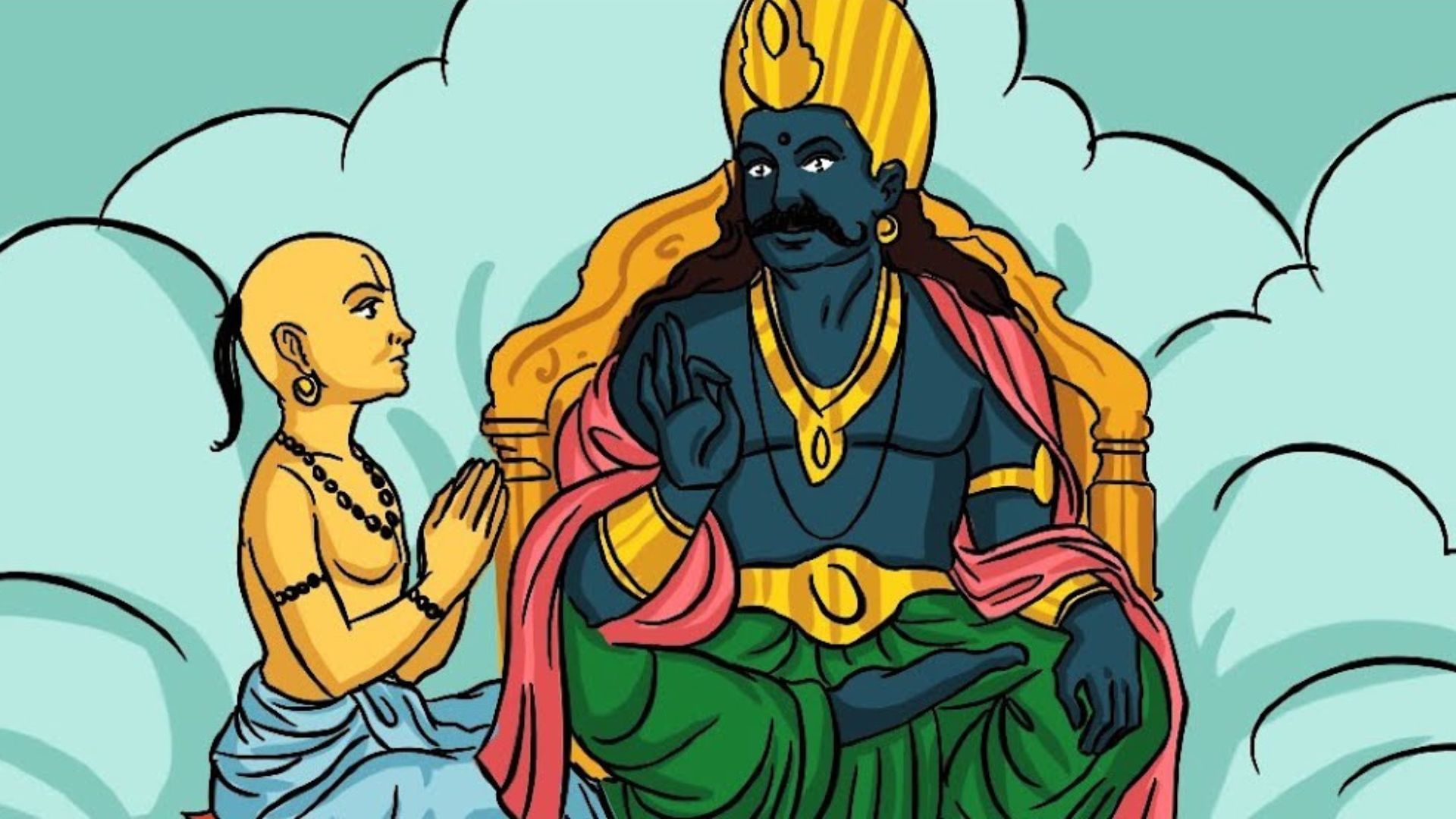
The young lad Nachiketa had much to learn. His brave approach made him wise and intelligent. Indians have compared the fighter pilot Nachiket's tryst with death to the meeting of Nachiketa with Yama, the God of death. Tamilnadu is known for its temples connected with Dharmaraja / Yama , the God of the other world. He dispenses justice based on the karma of each individual. Nachiketa made his father proud. The wise sages of Bharatavarsha had felicitated the proud father Vajashravas ( Uddalaka ) for begetting such a wise lad. Nachiketa had learnt the secrets of knowledge from Yama himself. This made him understand that knowledge is the real wealth and the ones who distribute it to others would get their names etched in the walls of time.
Sages have always led a holy life. They learnt and taught scriptures for the well being of the society. Teaching students and performing penances or sacrifices in the interest of the society was their daily routine. Their homes were situated amidst dense jungles and these places were known as Tapovans (penance groves). They stayed in kutirs (tiny dwellings) and Sage Uddalaka stayed in one such hermitage along with his spouse Vishwavaradevi. The learned Uddalaka was known for his sacrifices and was a well known philanthropist. He was known as Vajashravas because of his large free feeding programmes.
Vajashravas was also known for his bad temper. However he was a very nice person. No one could surpass him at a time when he was calm and composed. His spouse Vishwavaradevi was an embodiment of peace and chastity. She did her bit of work connected with the efforts of her husband and she considered him to be an incarnation of God himself. Vishwavaradevi wanted a good child and therefore Vajashravas performed a sacrifice in order to obtain a good child. Nachiketa was born thereafter. He was a good looking child and was known for his calm attitude. He would watch his father going on with his work but would never go near him.
Nachiketa would help his mother everyday. He would pluck flowers for her and he had learnt a number of verses from her. Vajashravas owned a large number of cows. Several rulers had given away a huge number of cows at a time when they were considered to be the real form of wealth. Nachiketa's mother used to worship the hermitage cows everyday and she told him that praying to a cow was akin to praying to one's own mother. She also made the young lad understand that if one goes around the cow, it would be equal to undertaking a pilgrimage. The punya (good merit) so collected would take a person to heaven. In spite of not being able to understand, young Nachiketa wanted to give at least one old cow to his friend Soma. Vishwavaradevi told her son that one should only donate a milch cow , otherwise this act would send the person to hell.
The young Nachiketa was keen to acquire knowledge and his father ensured that the lad learnt it all. One day, an elderly sage came to the hermitage and gave Nachiketa a mango but the young lad sought knowledge instead. Vajashravas asked him to keep quiet. But the visiting sage suggested that he should not get angry. Vajashravas requested the sage take up Nachiketa as his student and the latter agreed. An Upanayana (initiation ceremony) had been performed and Nachiketa moved to his Guru's hermitage. He was an obedient pupil. He learnt fast and also did the bidding of his teacher.
One day, a cow which was dear to Nachiketa passed away and he learnt that the soul of the animal was traveling to the abode of Yama. The sad young lad wanted to see Yama but his teacher told him that the ones who went to Yama's abode never returned. Meanwhile Nachiketa and his teacher had to visit his father Vajashravas. The father was performing the Visvajit sacrifice. One was supposed to give away all his possessions at the time of this sacrifice. It was performed in order to acquire good merit and fame. Vajashravas was warned not to get angry at the time of the sacrifice.
Vajashravas was busily giving away all his sick and old cows during the sacrifice. This worried Nachiketa for he did not want his beloved father to go to hell due to this act. He went to his father and wanted to know the name of the person who would receive him as a gift. The young Nachiketa wanted this to be done in order to prevent his father from going to hell. This angered Vajashravas and he stated that Nachiketa would be gifted to Yama, the God of death. This shocked the elderly sages present and they chided Vajashravas. It was too late by then and Nachiketa sat in the lotus posture (padmasana) and began to pray to Yama. He forgot the outside world.
Nachiketa opened his eyes and saw a huge palatial building. He understood that he was at the entrance of the palace of Yama and the city was known by the name Samyamani. The guards at the palace of Yama learnt that Nachiketa wanted to meet their boss. They informed the Queen and she requested them to bring him inside. Yama was traveling at that time and Nachiketa just refused to accept their hospitality. He chose a spot, put his deer skin on the floor and began to chant the name of God. He did so for three nights and did not consume a morsel even while waiting for Yama. The Gods were wonderstruck and stunned with the act of the brave and determined Nachiketa.
On his return Yama was advised by his Queen to let the boy inside the palace. Yama invited the young lad with folded hands. He offered a nice seat, milk fruits and three boons. Nachiketa told Yama that he was there to act upon the instructions of Yama. However, Yama wanted him to seek the three boons. The young lad requested Yama to get his father Vajashravas free from anger. He wanted to go back to his father in order to see the completion of the Visvajit sacrifice. He wanted his father to be peaceful and content. Nachiketa wanted his father to accept him again. Yama agreed to grant the first boon.
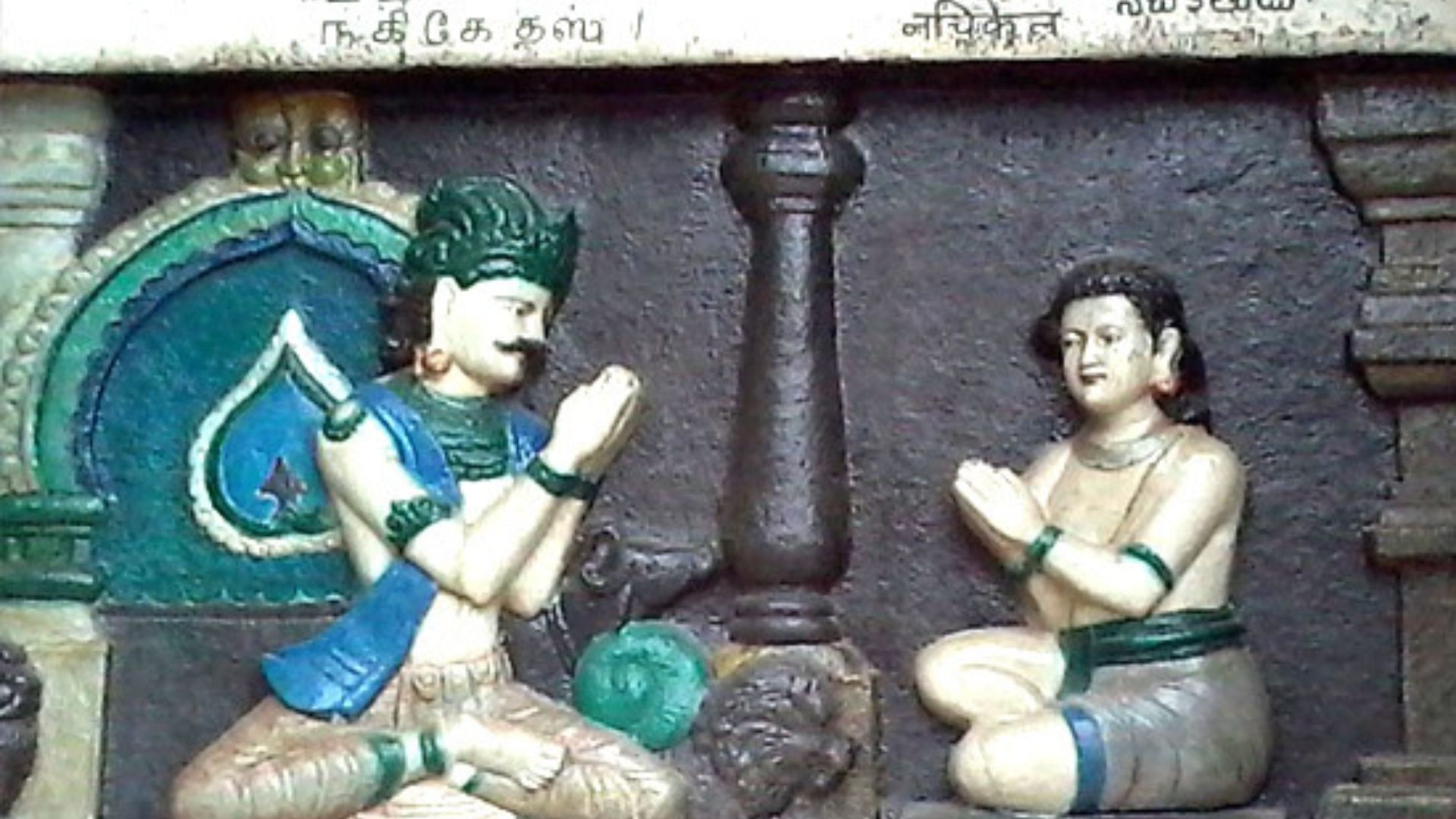
Nachiketa wanted the knowledge of Fire (Agni Vidya) from Yama. The wise boy had learnt that the Gods and Goddesses at heaven do not know fear or old age. They were also free from the clutches of death. Yama was stunned and was put in a dilemma. He told Nachiketa that he was really dedicated. Therefore he preached to him the ' Knowledge of Fire ' but with a caveat. He was told that only the wise one who was endowed with a very good memory would be able to retain the knowledge thus acquired. He wanted, therefore, to test the absorption level of Nachiketa. The brilliant and wise learner repeated everything perfectly. He did not miss even a syllable. Yama admired the knowledge and dedication of Nachiketa and additionally granted a boon of his own. The knowledge of fire was to be henceforth known as ' Nachiketaagni ' and the one who acquired this knowledge would attain Godhood immediately. He then placed a garland made of gems on the neck of Nachiketa.
The third boon made Yama wonderstruck. Nachiketa had been reminded of the death of a cow in the hermitage of his Guru. He wanted to know how to overcome grief. Nachiketa had already understood that every being was mortal and they undergo a cycle of happiness or grief in accordance with their deeds. He wanted to know the secret behind the cycle of births and deaths. Of course he knew that the soul was eternal. To put it simply, Nachiketa wanted to know how to overcome all this. Yama offered him wealth, money and emperorship instead of all this. He suggested that Atmavidya (knowledge of the self) was for elders and would be too tough for anyone for that matter.
The determined Nachiketa pressed for the third boon and Yama had no choice but to teach the young sage. He taught the knowledge of Yoga along with that in the interest of humanity. The teachings ran thus, " One should be lucky to be born as a human. This gives him an opportunity to cultivate good friends and learn good things. This should be put to use and he should do good for others. Nachiketa was told that it would be a sin to keep bad company. He was also told that one's evil thoughts motivated bad actions and one should desist from entertaining them. Nachiketa was made to understand that none should suffer because of our own actions and grief would overtake us if we acted sinfully. "
Nachiketa understood more through his conversation with Yama. "Learned people must abstain from sinning. Only an ignorant person sins and has to pay for the same by being born again. That is why it is said that the body perishes and not the soul. One has to attain salvation in order to avoid grief. The Lord Almighty is the greatest. He is omniscient and omnipotent. It is possible to see him through the sun, moon, man and even animals. One should feel the presence of God everywhere and in everything. Nachiketa was taught that there is no such thing as low or high born. In fact the nature of a person was more important. Doing good for all was important. The one who serves everyone was said to attain salvation. After stating thus, Lord Yama blessed Nachiketa. He blessed him to become a devotee of God and that he would always do good for everyone."
This learning made Nachiketa a fine person. The young sage acquired a divine luster and this surpassed even that of the Devas. He sought the blessings and permission of Yama to go back to his parents. His boons were granted and he was advised by Yama to share the knowledge acquired to everyone in the world. The heavenly words of Lord Yama were heard by everyone. These words reached the sacrificial hall of Sage Vajashravas. The people present witnessed the lustrous Nachiketa descending amidst them with a jeweled garland on his neck. On being queried Nachiketa shared the details of his experience with Yama to one and all present.
The sages were overjoyed with Nachiketa. They told Vajashravas that the fruits of the Visvajit sacrifice had doubled because of Nachiketa. They stated that Nachiketa would forever be venerated since he was the reason for the knowledge of fire - Nachiketaagni to come into the world. Nachiketa had also brought in the knowledge of the self (Atmavidya) to earth. They stated that the young Nachiketa had become a sage and that his name will be ever present in the Vedas and he will remain immortal.
This story is narrated in the scriptures. The section is known as 'Kathopanishad'. It is part of the Krishna Yajur Veda. All the above mentioned details are present in this book and it has been translated into all the major languages of the world. Several foreigners have written treatises upon it!
Nachiketa had carried knowledge to earth. His tender age did not stand as a deterrent . He had argued with Yama by stating that knowledge was supreme. Nachiketa had become a gem among scholars and sages. His service to his parents and teachers are ever worthy of emulation. Nachiketa's only wish was the well being of the world and its people. The young wise boy was responsible for bringing the lamp of knowledge from heaven to earth. Let us remember the joint prayer of the teacher and the pupil as found in Kathopanishad while celebrating the great Nachiketa.
"May God protect us together. May he nourish us together. Let us be engaged in bold and purposeful activities. Let our noble study be full of luster. Let us not have ill feelings between us".
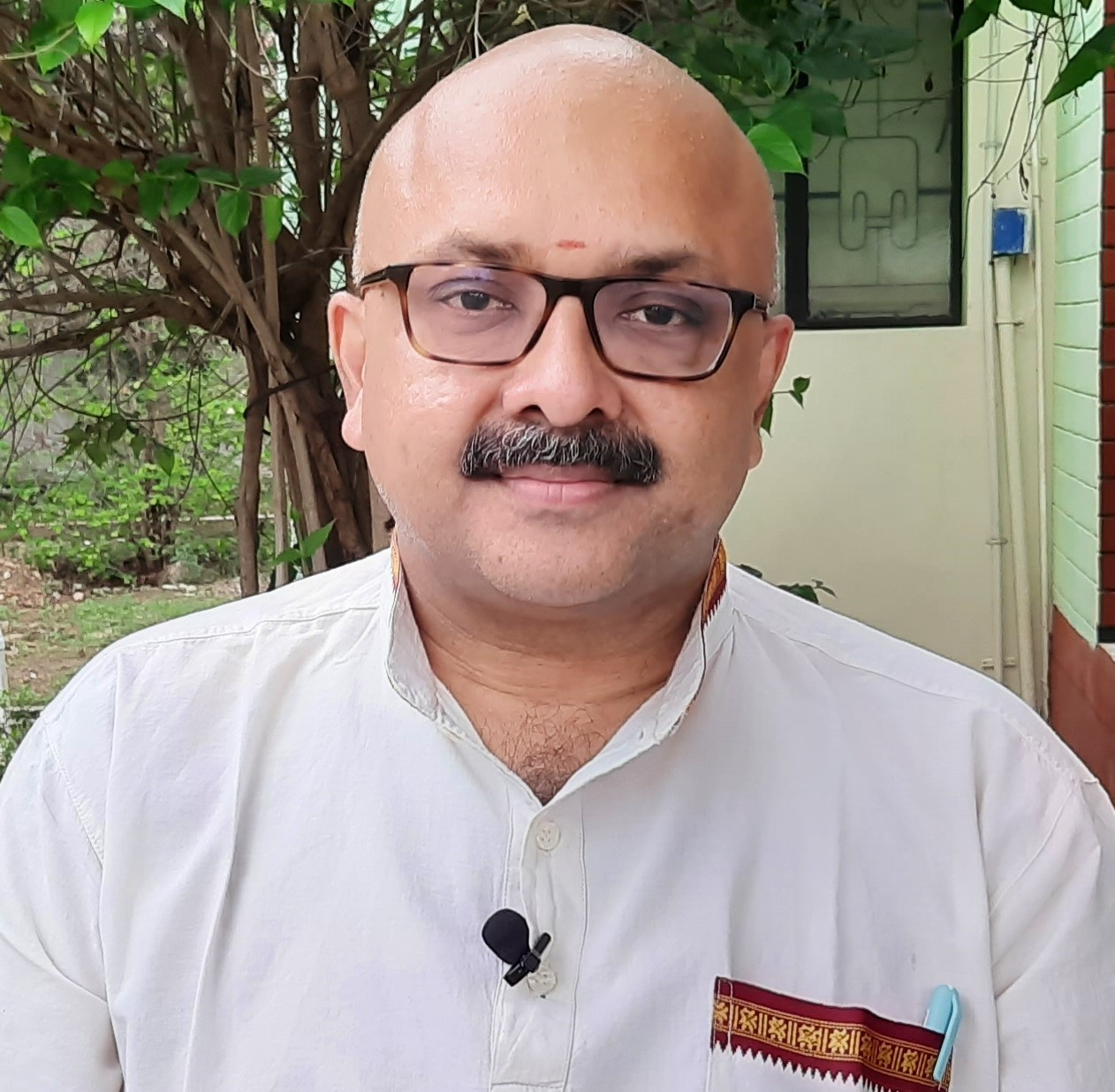 Mr. Rajesh Govindarajulu is one of the founding members of The Verandah Club Pvt. Ltd. He is a leading columnist, historian, jeweler, entrepreneur, and a heritage enthusiast who is earnestly working to revive the past in the light of the present. Experiential learning about the history of Coimbatore is his main course of interest and he is also a panel member of many colleges in the city.
Mr. Rajesh Govindarajulu is one of the founding members of The Verandah Club Pvt. Ltd. He is a leading columnist, historian, jeweler, entrepreneur, and a heritage enthusiast who is earnestly working to revive the past in the light of the present. Experiential learning about the history of Coimbatore is his main course of interest and he is also a panel member of many colleges in the city.
NEXT ARTICLE
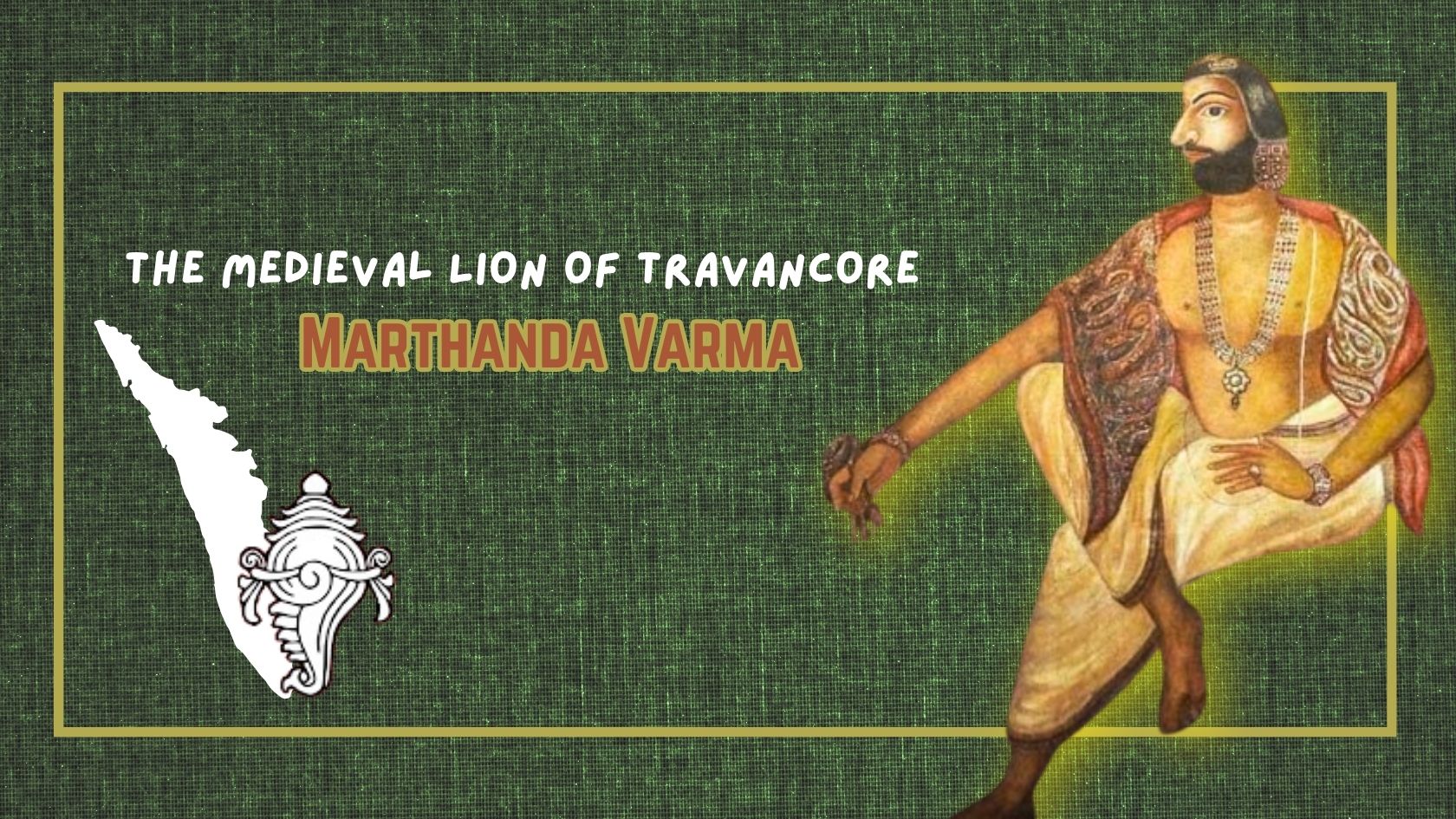
Shri Ramachandra Prasad's captivating narrative and the hot chai that was served at the right time transported me to ancient Kerala, where the extraor...
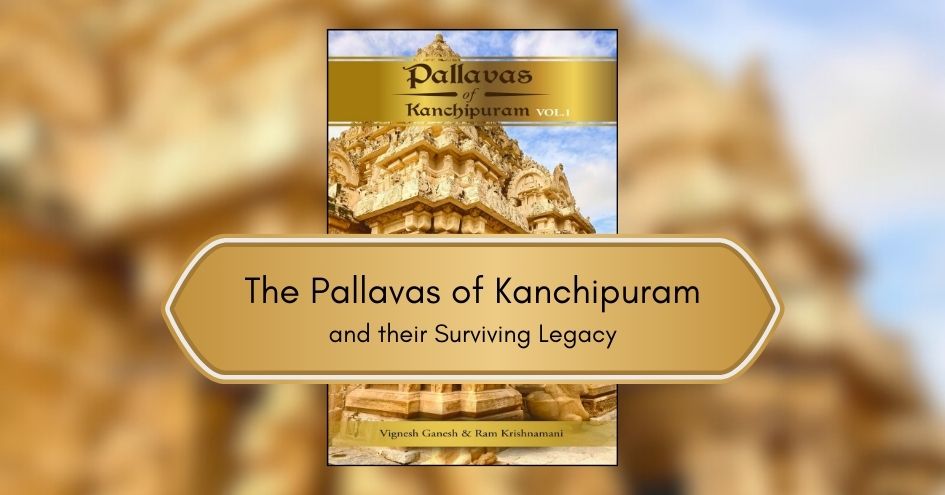
Introduction In Bharatvarsha, History is not the account narrated by victors. It is the record left behind by survivors. The study of Indian History...
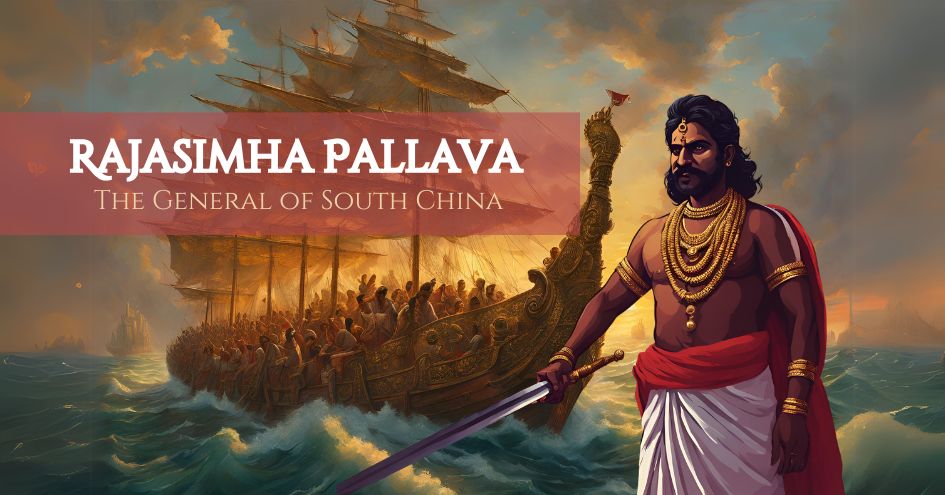
It is the first-half of the 8th Century C.E. in South India. The Pallava kingdom possesses strength and prosperity with some of the greatest monument...